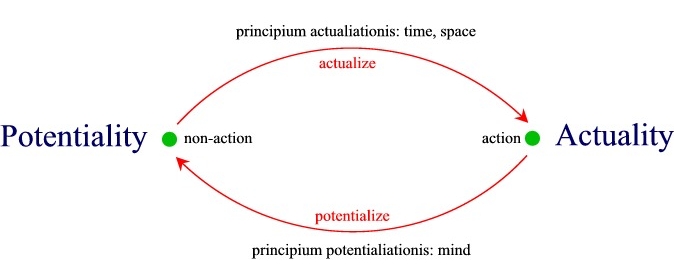
Etymology
Potentiality:- Initially from Aristotle: δύναμις (dynamis): capability of existing or acting, potentiality, power, faculty, capacity.
- Translated to Latin as potentia, from potere/posse (be powerful, be able).
-
Common usage:
- Capable of being but not yet in existence, latent.
- Having possibility, capability, or power.
- Possessing the capacity for growth, development.
- Synonyms: dispositional, virtual, possible, unrealized, unexpressed, latent, potency, conceivability.
-
Philosophical usage:
- Aptitude to change, to act or to be acted upon, to give or to receive some new determination (capable of determination).
- Potentia = determinable being.
Actuality:
- Initially from Aristotle: ἐνεργέια (energeia): activity, operation, performance, full reality, act, functioning, actualization.
- Also from Greek: ἐντελέχεια (entelecheia): full, complete reality; state of completion or perfection; the form that is actualized, actuality, perfection.
- Translated to Latin as actus (act, motion, action), from agere (act, do).
- Also from Latin: actualis (what exists in reality, effective, active), actualitas (reality, effectiveness).
-
Common usage:
- Existing and not merely potential or possible.
- Synonyms: real, occurrent, existent, realization, entelechy, substantiality, determination.
-
Philosophical usage:
- The fulfillment of the capacity to change, to act, or to give or receive some new determination.
- Actus = determined being.
The Two Processes of Actualization and Potentialization
1. From Potentiality to Actuality (Actualize):- Principle: principium actualiationis (individuation, actualization).
- Factors of actualization: time, space (= matter). Matter is the finite and concrete aspect of the human being.
- Action translates to motion, which is fundamentally action in time and space. To act means to exist, to sustain its own being and existence. There is no life without acting. Action as the transition from potentiality to actuality means change, both quantitative and qualitative change.
- Principle: principium potentialiationis (deindividuation, potentialization).
- Factor of potentialization: mind. Mind is the infinite and universal aspect of the human being. Mind has the capacity to transcend itself, to go beyond its individuality to the universal ground of reality, which is pure potentiality.

Figure 1 - Actualization and Potentialization
Note the prefix 'en-' (in, into) in en-ergeia and en-telecheia: it could be translated as in-actuality or in-actualization. I also described this process when discussing in-formation, the process of instantiating form from the potentiality of the ultimate reality 'into' the actuality of the perceived reality of our universe (see Essay Knowledge and Information).
Similarly, the process of actualization is a process of initiating action into the time-space continuum, which causes change and transition from potentiality to actuality. To exist is the same as to act. Acting is not just considered the outward, expressed form of action or activity that is observable, but also the cognitive activity of our mind. Anything that happens or occurs in time and/or space, any event is a determined action.
Acts are determined, concrete, and individual(plurality of phenomena). Since acts are the result of actualized potentiality, they are at the same time also potentialized actualities, i.e., the refer back to the unitary potentiality out of which they were en-acted. In other words, although acts are the result of the actualization process, acts also are the initiators of the reverse process: potentialization.
Mind, as the factor of potentialization, moves in two dimensions: a) the actual dimension of noetic activity (rationality) and the b) potential dimension of Paranoesis , which consists not in a form of activity or action (which is always concrete), but in a state of non-activity (compare Taoist concept of 'wu-wei' = non-action) that transcends the individual form of our mind in order to become universal and therefore potential (an-energeia).